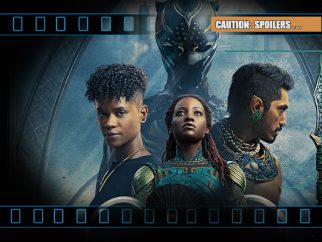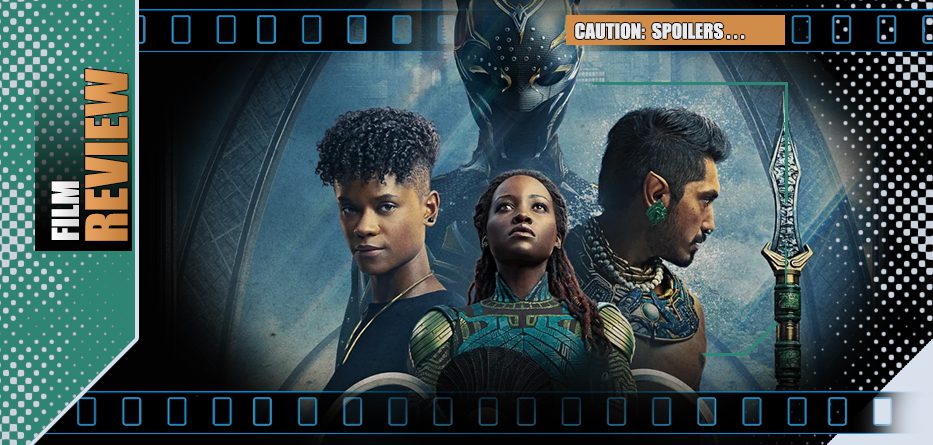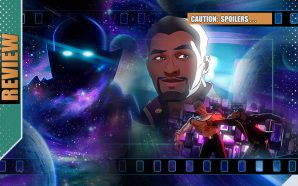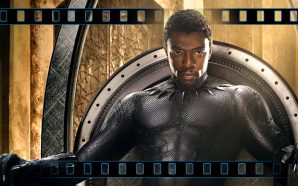The kingdom of Wakanda is in mourning as their king, T’Challa, dies, but as the country celebrates his life and memory, there are those who find it hard to accept his passing and those who would take advantage of a land suddenly without its most prominent protector. T’Challa’s sister Shuri is distraught – her scientific skills failed to save her sibling and Wakanda’s spiritual soul offers her no solace. But even as T’Challa’s body is taken to its rest, the world looks to the subject of vibranium, wanting the country to finally share its wealth and perhaps apply pressure for it to do so, even as it scours the globe for other deposits of the rare mineral.
And far under the sea, it appears another vibranium source may have been found, but it too has its protectors and now Wakanda finds itself in an uncomfortable position. Should it stand with the countries of the world that have already displayed their suspect intentions… or fight alongside the forces of Namor who has made his own decision clear: that Wakanda must ally itself with his cause to protect itself and burn the surface world once and for all… or face his wrath.
Either way it seems that Wakanda and its people face an impossible choice and an almost certain war that will change them forever…
*spoilers*
There are two ways to judge Black Panther: Wakanda Forever and both of them are entirely valid.
On a tribute level there’s no denying that the film is a love-letter journey of legacy and from the moment the usual Marvel logo opening branding gets transformed into a silent montage of Chadwick Boseman’s character moments, all enveloped with a royal purple hue, you’re likely to feel the wave of emotion that the film will try to unpack… and that such a task is the number one intent of doing this film for all involved on a creative level.
And there were solid, reasonable arguments against that for a long while. Boseman, the talented, enigmatic, soft-spoken actor at its heart was gone, passing from cancer in 2020 at the age of only 43 after privately dealing with the illness for several years. Fans were shocked, but for the studios the pragmatic problem was apparent. A sequel to one of the most impactful mainstream movies of recent years and Marvel‘s most noticeable outreach success had seemed inevitable and so things pivoted to the awkward nature of possible recasting (after all, it’s been done plenty of times already for characters in the MCU). Many were wary of that route. The film’s unique resonance and Boseman’s personal impact had been so great and his early death felt so keenly that recasting T’Challa was quickly ruled out. But could the franchise survive while honouring everything that had gone before with a new character donning the Black Panther suit? Original director Ryan Coogler pondered and consulted others and decided that they could – balancing the idea of legacy on several levels and so the sequel went into production, with much of the story kept under wraps and with anticipation growing beyond usual (and perhaps realistic) expectations.
The result, judged as a testament to the grieving process, is palpable and much of the film looks at how we deal with loss… and the good and the bad that can come from it. The film starts to explore that on an individual and cultural level as T’Challa’s family and country come to term with the sudden loss of a king, a son, a brother and an icon. The streets of Wakanda are full of tears and dance, mourning white dresses swirling under the African sun and processions full of colour and music, the kind of tragic and joyous celebration of a life well-lived that any of us could wish for (albeit strangely absent of any of his Avenger comrades who you’d expect to be there to honour him). It’s necessary for the film to set these actions in stone before it can go any further.
Letitia Wright is good, reprising the role of Shuri, hit hardest by the loss of her brother and her inability to use her science to save him (dying in the opening minutes off-camera from an undefined condition). She’s angry at the world and can’t find the peace that most of her family find in the Wakandan faith of a generational afterlife, nor getting the answers she needs from her beloved science. It’s a difficult balance for the character and even more so for the actor on whose shoulders a lot of the film must place its weight and she’s mostly up to the demands of the job, though far less memorable or magnetic a presence as Boseman.
However, truth be told, she’s better in the civilian/princess role trying to find personal answers about life and assessing the new aquatic threat to Wakanda than she is in assuming the actual role of the new Black Panther. That key decision comes so late in the film that you’re beginning to suspect that her inheritance of the role, which was something of a foregone conclusion, might actually be a feint. But she does eventually take on the mantle, her scientific whizz allowing a new suit to be designed in mere days and a brief montage. While Boseman had a casual, unique charisma that few could match, bringing a noble humanity to his Avenger and country’s protector in costume or not, Wright’s hero is less interesting, ultimately an anonymous superhero figure that merely jumps around a lot and for the relatively brief screen-time might as well be a totally CGI creation until her last arc moments deciding how to truly honour her brother’s legacy. That’s also true of several other characters and I, for one, find it frustrating that the talents of Danai Gurira as Okoye and others are suddenly hidden behind yet another set of face-plated armour when there’s no real narrative need.
The other MVPs include Angela Bassett, reprising her role as Queen Ramonda, taking over the royal duties again after T’Challa’s demise and also not taking any crap from the wider world about Wakanda’s status. Richard Schiff (The West Wing) briefly appears as the US Secretary of State trying to sort out how the world proceeds in its desire for vibranium, but receives short shrift when the Queen parades captive French mercenaries who’ve already tried to seize some samples. She warns, very convincingly, that should there be any more incursions into Wakanda’s territory and interests, they will not be met with restraint. It’s this shifting state-of-play that sets the backdrop for a post-T’Challa world and doesn’t make the UN (particularly France) look like allies. Bassett’s Queen, imposing though she may be until more tragic events overtake her, has a point about boundaries and while the world might also be understandably nervous, the film clearly paints other countries as the opportunists and aggressors. It also sets the scene for the alliances that Wakanda must choose – the surface world that’s already set about plundering its assets or the new underwater empire of Talokan that would be willing to watch the surface world burn to protect its assets.
Tenoch Huerta Mejia is an interesting choice as the ageless Namor, formally introducing the first ‘mutant’ to the big-screen MCU and fleshed out with a backstory that mirrors colonial conquest and subjugation through the centuries. Like Michael B. Jordan’s Killmonger in the first film, he’s a man making salient points about the treatment of his people but doing so in overtly aggressive ways and no patience for diplomacy. Marvel clearly have plans for Namor, this previously uncharted life aquatic and the shifting face of the MCU‘s social-political divides and it will be interesting to see how they develop a character whose ‘Imperious Rex’ moniker has proved him to be a hero and a villain in the comics depending on his mood. But let’s pretend to ignore the ankle-wings, okay?
There are other welcome faces reprising their roles such as Lupita Nyong’o as Nakia (a spy of the highest talents and T’Challa’s love) who gets a fair amount to do and a key role in the mid-credits scene and Wisnton Duke returning as M’Baku (offering Shuri some of the most sage advice she receives in the entire film) but elsewhere there’s just too many characters marking time and merchandising opportunities. Alex Livinalli as Attuma and Mabel Cadena get little more than name-checks and most of the Dora Milaje fighters are interchangeable. Dominique Thorne as Riri Williams is great, but after a decent entrance is largely surplus to requirements as she takes the ‘prodigy’ role Shuri had in the first film and readies for further adventures in upcoming Marvel series Ironheart. It’s always fun to see Martin Freeman (as Everett Ross) and Julia Louis-Dreyfus (as Valentina Allegra de Fontaine) but they too are more of the winks-to-camera that they’ll have more to do at a later date (think Thunderbolts), though their on-screen relationship is an unexpected piece of fun.
There’s undeniably full-marks for the production design department who get the healthiest slice of the budget and rise to the challenge of visually creating an entire civilisation and culture beyond the already nuanced Wakandan spires. Namor’s Talokan city (stepping in for the Atlantis of the comics) is one part Aquaman and one-part Pandora. There’s a rich visual history lesson dating back to the Conquistadors of the 1600s and told in unflinching flashback but it’s like world-building with a palette rather than a keyboard , a cursory travel brochure that entices further investigation later but keeps its secrets.
The problem with Wakanda Forever, though, is that take away the innate emotional baggage of the film and what’s left is a strangely-paced rather generic venture that veers between deep emotion and rather emotionless, overblown CGI-enhanced set-pieces, hiding its best assets behind visual effects. When the hand-to-hand combat is up-close and personal, it’s impressive, less so when it’s at-adistance pixels flying around the screen. On one hand it doesn’t have enough narrative material to fill its close to three hours push, but, ironically, might have been served better by a short mini-series of episodes allowing some more organic expansion of its themes.
At the end of the film, there’s a fair amount left up in the air. M’Baku seems to be challenging for the role of Wakanda’s ruler and Shuri is off visiting Nakia in Haiti and finding (in that mid-credit sequence) an unexpected new face. As a celebration of Chadwick Boseman and the Black Panther legend, the film does the difficult part of the job well, as an action adventure it feels rather generic and forgettable and as a closing chapter of Marvel‘s proclaimed ‘Phase 4‘ stories it’s all more of a comma or ‘…‘ than a close.
It’s definitely worth watching for what it does and what it tries to do and if it’s an imperfect sequel to the original and superior Black Panther in several ways, it still a cat with some claws.

- Story8
- Acting9
- Direction8
- Production Design / VFX10











